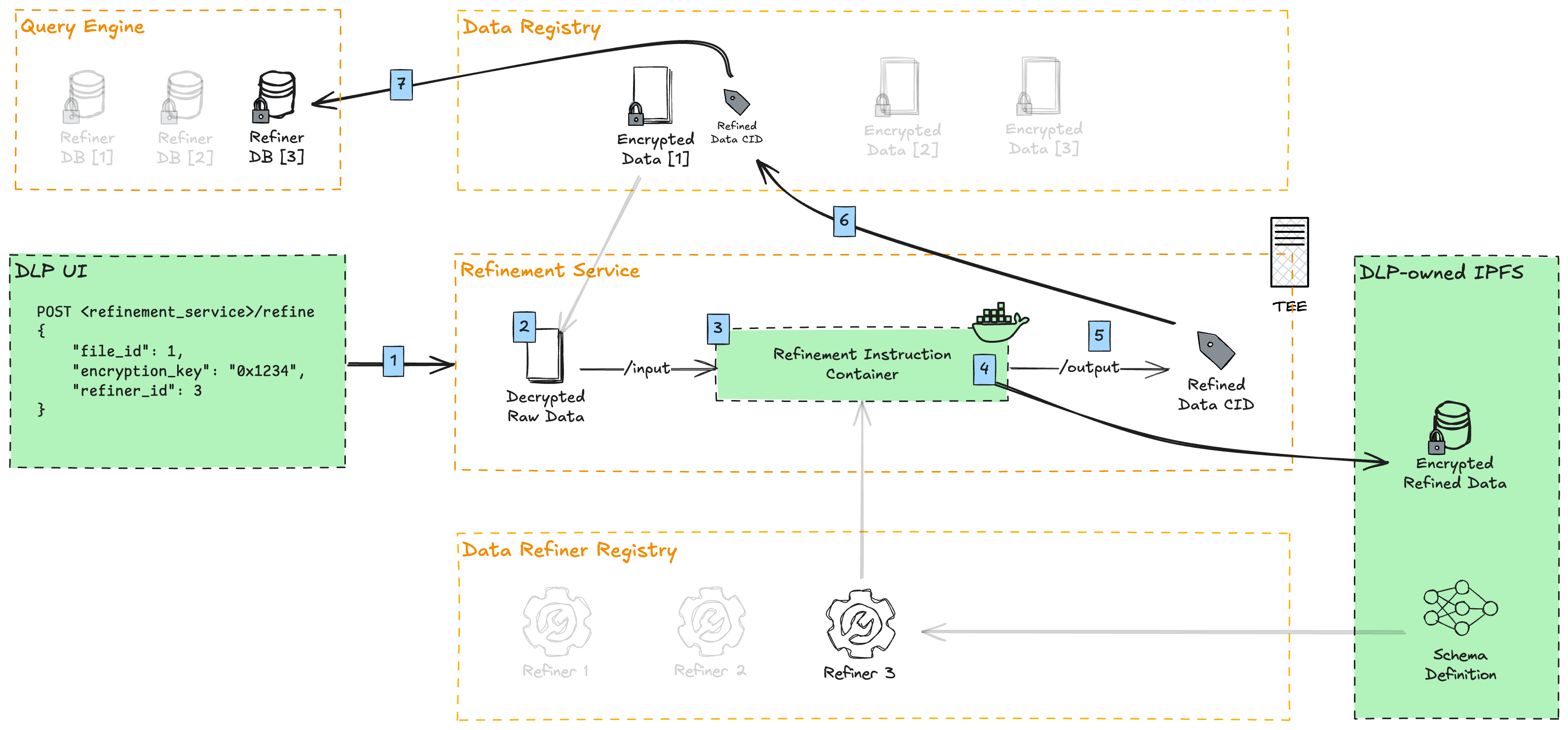This repository serves as a template for creating Dockerized data refinement instructions that transform raw user data into normalized (and potentially anonymized) SQLite-compatible databases, so data in Vana can be querying by Vana's Query Engine.
Here is an overview of the data refinement process on Vana.
- DLPs upload user-contributed data through their UI, and run proof-of-contribution against it. Afterwards, they call the refinement service to refine this data point.
- The refinement service downloads the file from the Data Registry and decrypts it.
- The refinement container, containing the instructions for data refinement (this repo), is executed
- The decrypted data is mounted to the container's
/inputdirectory - The raw data points are transformed against a normalized SQLite database schema (specifically libSQL, a modern fork of SQLite)
- Optionally, PII (Personally Identifiable Information) is removed or masked
- The refined data is symmetrically encrypted with a derivative of the original file encryption key
- The decrypted data is mounted to the container's
- The encrypted refined data is uploaded and pinned to a DLP-owned IPFS
- The IPFS CID is written to the refinement container's
/outputdirectory - The CID of the file is added as a refinement under the original file in the Data Registry
- Vana's Query Engine indexes that data point, aggregating it with all other data points of a given refiner. This allows SQL queries to run against all data of a particular refiner (schema).
refiner/: Contains the main refinement logicrefine.py: Core refinement implementationconfig.py: Environment variables and settings needed to run your refinement__main__.py: Entry point for the refinement executionmodels/: Pydantic and SQLAlchemy data models (for both unrefined and refined data)transformer/: Data transformation logicutils/: Utility functions for encryption, IPFS upload, etc.
input/: Contains raw data files to be refinedoutput/: Contains refined outputs:schema.json: Database schema definitiondb.libsql: SQLite database filedb.libsql.pgp: Encrypted database file
Dockerfile: Defines the container image for the refinement taskrequirements.txt: Python package dependencies
- Fork this repository
- Copy
.env.exampleto.envand modify the values to match your environment - Update the schemas in
refiner/models/to define your raw and normalized data models - Modify the refinement logic in
refiner/transformer/to match your data structure - If needed, modify
refiner/refiner.pywith your file(s) that need to be refined - Build and test your refinement container
Copy .env.example to .env and configure the following variables:
# Local directories where inputs and outputs are found
# When running on the refinement service, files will be mounted to the /input and /output directory of the container
INPUT_DIR=input
OUTPUT_DIR=output
# This key is derived from the user file's original encryption key, automatically injected into the container by the refinement service
# When developing locally, any string can be used here for testing
REFINEMENT_ENCRYPTION_KEY=0x1234
# Schema configuration
SCHEMA_NAME=Google Drive Analytics
SCHEMA_VERSION=0.0.1
SCHEMA_DESCRIPTION=Schema for the Google Drive DLP, representing some basic analytics of the Google user
SCHEMA_DIALECT=sqlite
# IPFS configuration
# Required if using https://pinata.cloud (IPFS pinning service)
PINATA_API_KEY=your_pinata_api_key_here
PINATA_API_SECRET=your_pinata_api_secret_here
# Public IPFS gateway URL for accessing uploaded files
# Recommended to use own dedicated IPFS gateway to avoid congestion / rate limiting
# Example: "https://ipfs.my-dao.org/ipfs" (Note: won't work for third-party files)
IPFS_GATEWAY_URL=https://gateway.pinata.cloud/ipfsTo run the refinement locally for testing:
# With Python
pip install --no-cache-dir -r requirements.txt
python -m refiner
# Or with Docker
docker build -t refiner .
docker run \
--rm \
--volume $(pwd)/input:/input \
--volume $(pwd)/output:/output \
--env PINATA_API_KEY=your_key \
--env PINATA_API_SECRET=your_secret \
refinerIf you have suggestions for improving this template, please open an issue or submit a pull request.
